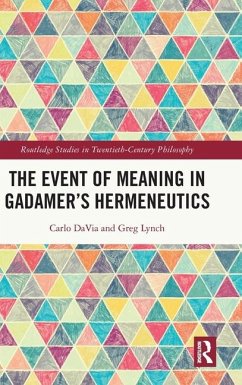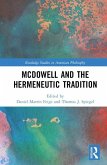This book presents the first detailed treatment of Gadamer's account of the nature of meaning. It argues both that this account is philosophically valuable in its own right and that understanding it sheds new light on his wider hermeneutical project.
Whereas philosophers have typically thought of meanings as belonging to a special class of objects, the central claim of Gadamer's view is that meanings are events. Instead of a pre-existing content that we must unearth through our interpretive efforts, for Gadamer the meaning of a text is what happens when we encounter it in the appropriate way. In events of meaning the world makes itself intelligibly present to us in a manner that is uniquely and irreducibly bound up with the concrete situation in which we find ourselves. When we recognize that Gadamer thinks of meaning in this way, we are better positioned to appreciate what his wider views amount to and how they hang together. Gadamer's accounts of interpretive normativity, the aspectival character of understanding, and the nature of essences, for example, snap into more vivid relief when we see them as outgrowths of his underlying conception of meanings as events.
The Event of Meaning in Gadamer's Hermeneutics will especially appeal to researchers and advanced students working in hermeneutics, phenomenology, and the philosophy of language. More broadly it will be of interest to humanities teachers and researchers concerned with the question of how texts from distant cultures can be relevant to readers here and now.
Whereas philosophers have typically thought of meanings as belonging to a special class of objects, the central claim of Gadamer's view is that meanings are events. Instead of a pre-existing content that we must unearth through our interpretive efforts, for Gadamer the meaning of a text is what happens when we encounter it in the appropriate way. In events of meaning the world makes itself intelligibly present to us in a manner that is uniquely and irreducibly bound up with the concrete situation in which we find ourselves. When we recognize that Gadamer thinks of meaning in this way, we are better positioned to appreciate what his wider views amount to and how they hang together. Gadamer's accounts of interpretive normativity, the aspectival character of understanding, and the nature of essences, for example, snap into more vivid relief when we see them as outgrowths of his underlying conception of meanings as events.
The Event of Meaning in Gadamer's Hermeneutics will especially appeal to researchers and advanced students working in hermeneutics, phenomenology, and the philosophy of language. More broadly it will be of interest to humanities teachers and researchers concerned with the question of how texts from distant cultures can be relevant to readers here and now.
"By using the lens of the event of meaning, DaVia and Lynch revive the legacy of Gadamer's hermeneutics and show Gadamer in a new light, opening up new encounters with his work from both continental and analytic philosophical approaches to language, meaning, and interpretation."
Gert-Jan van der Heiden, Radboud University, The Netherlands
Gert-Jan van der Heiden, Radboud University, The Netherlands








